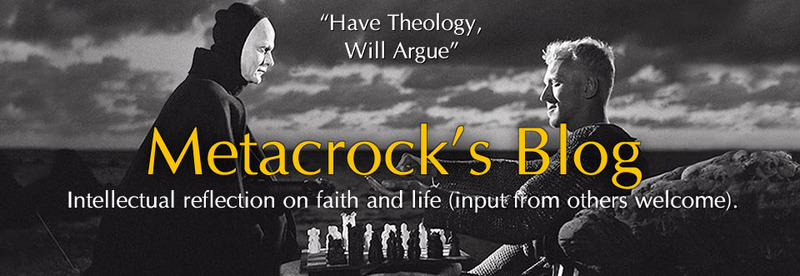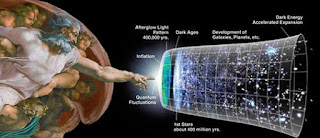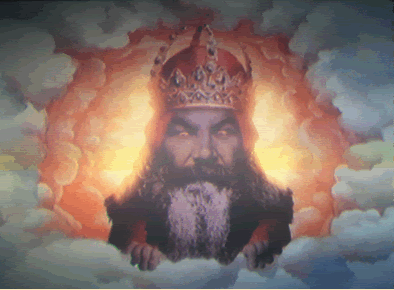I am trapped between the two camps. On the one hand former professors and mentors who I admire and whose opinions I respect do not like this stuff for this very reason; God must be a person or an impersonal force, they can’t worship an impersonal force. On the other hand, Tillich, who I also admire, saw the problems and dangers of the “big guy in the sky.” Of course the former professors don’t think that God is just a big man, but some form of universal mind. Yet the problem is, isn’t a universal mind just a jumped-up big man? As Tillich said, if God is “a person” then “he” is subject to being itself rather than occupying the central position in ontology as being itself. The proposal made in chapter 4 was to speak of “the ground of being” rather than “being itself.” That may bail Tillich out of the problems of Jean-Luc Marion, God beyond (without) being, but may work for the issue of God beyond being, but it may not work for the problem here because it doesn’t tell us why the ground of being can be personal. We might even ask why should we think God is personal to begin with? Before I answer this, however, I will define my position: I accept Tillich’s notions of the problems with the big guy in the sky. I also add my own litany of problem, centering on the way atheists frame the question of God as “big man in the sky.” I also accept the need to understand God as “someone” a will, a volitional consciousness that knows my name. The reason for this I will deal with latter. To meet these concerns I will elucidate a position that allows one to understand the ground of being as transcending the human understanding of consciousness and person but containing the aspects of consciousness required in meeting those concerns. God is not a big man in the sky, a universal consciousness need not be associated with a biological organism, a brain or what we know as analogous to our own existence; we need not understand humanity as the only possible form of consciousness.
I am committed to the notion that God is aware of us, that God feels and cares and God's character is love, which is pretty "personal." I am also committed to re-thinking the concepts involved in "personal." I think think Tillich was near the answer. It would be worth it to know what he really said on the subject. The following is based upon a article he wrote when he was young, the early 30's, and the things he says in The Courage to Be, which he wrote much latter in life.
Tillich’s Rejection of the God of Theism
The theistic view of God is usually understood as the idea of a “person” or an aware mind that is surveying reality and creating out of rational wisdom. It is this concept of a mind surveying a world it creates that is part of the problem, it makes God into “the supreme being” or the greatest part of reality. A part is still subject to or limited by the whole.
The God of theological theism is a being beside others and as such part of the whole of reality. He certainly is considered its most important part, but as a part and therefore subject to the structure of the whole. He is supposed to be beyond the ontological elements and categories which constitute reality. But every statement subjects him to them. He is seen as a self which has a world, as an ego which is related to a thou, as a cause which is separated from its effect as having a definite space and an endless time. He is a being not being itself. As such he is bound to the subject/object structure of reality, he is an object for us as subjects and this decisive for the necessity of transcending theological theism. [3]At a 1940 conference on Science, Philosophy, and Religion, Einstein presented a paper arguing against the notion of a personal God. Tillich agreed with Einstein and wrote an answer in which he largely sided with the physicist. Tillich thought it was significant for who presented it. “They [the arguments] are neither new nor powerful in themselves. But in the mouth of Einstein, as an expression of his intellectual and moral character, they are more significant than the highly sophisticated reasoning of somebody else.”[4] Everyone tries to use Einstein, that’s a sure sign of being a crank. Yet this article is significant not because it enlists the great scientific thinker for a particular position but because it shows Tillich’s early pre American thought. Tillich summarizes the arguments:” Einstein attacks the idea of a personal God from four angles:
*The idea is not essential for religion.
*It is the creation of primitive superstition.
*It is self-contradictory.
*It contradicts the scientific world view.”[5]
He dismisses the first argument immediately on the grounds that the question about God and the personal must be answered before we understand the nature of religion, and moves on to the historical argument. He argues that it’s misuse tells us nothing about it’s genesis. Before it could be abused it had to be used. So what is its proper use? He says:
Looking at the tremendous impact the idea of God always has made on human thought and behavior, the theory that all this was a product of an uneducated arbitrary imagination appears utterly inadequate. Mythological fantasy can create stories about Gods but it cannot create the idea of God itself, because the idea transcends all the elements of experience which constitute mythology. As Descartes argues: the infinite in our mind presupposes the infinity itself.[6]The concept of a personal God is deemed self contradictory because God is depicted as creating both good and evil. God is also understood as the source of morality and thus should not be able to create evil, but as the omnipotent creator of all things God must create evil in some sense. Tillich counters this argument by denying the classical concept of omnipotence. He retrenches into the concept of the ground of being, and opposes it to the classical notion of omnipotence. On the one had we have a big man in the sky who is supposed to be all good but in some sense allows evil, or creates it directly, as opposed by this notion of the power of being which is in all things and through and beyond all things. So Tililch’s God is not a direct maker of the world, not a first cause at all. In the process of denying omnipotence Tillich also denies God as the first cause. He asserts that God acts in beings to suit their special nature. In humans God acts in a personal way and in plants God acts in an impersonal way. For Tillich God is not a wielder of final cause but is a conduit for cause distributed throughout all of reality. Here he is referring to the panENtheist assumptions of his view. God is in all things and as such is relating to them in the manner of a unifying source rather than a direct manipulator.[7] God for Tillich is the unconditioned boundless undifferentiated unity.
But it is an old and always emphasized theological doctrine that God acts in all beings according to their special nature, in man according to their rational nature, in animals and plants according to their inorganic nature. The symbol of omnipotence expresses the religious experience that no structure of reality and no event in nature and history has the power of preventing us from community with the infinite and unexhaustible ground of meaning and being. What "omnipotence" means should be found in the words Deutero — Isaiah (Is. 40) speaks to the exiled in Babylon when he describes the nothingness of the world-empires in comparison with the divine power to fulfil its historical aim through an infinitely small group of exiled people. Or what "omnipotence" means must be found in the words Paul (Rom. 8) speaks to the few Christians in the slums of the big cities when he pronounces that neither natural nor political powers, neither earthly nor heavenly forces can separate us from the "Love of God." If the idea of omnipotence is taken out of this context and transformed into the description of a special form of causality, it becomes not only self-contradicting — as Einstein rightly states — but also absurd and irreligious.[8]In moving on to the fourth objection Tillich agrees with Einstein, and lays down two methodological caveats. The first such caveat is that we not make God of the gap arguments. That we not make doctrines or predicate our theology in “the dark places” where scientific knowledge has not penetrated. This is because eventually it probably will penetrate and destroy that theology. This he says happened over and over again to ninetieth century thinkers. He argues that theology must leave to science the description of things and leave to philosophy the description of being itself and the logos in which being becomes manifest. Here he means logos in the sense of the Greek Philosophers, reason, not Christ. The second methodological caveat is that he demands of scientific thinking skeptics and critics of theology that they attack the most advanced and modern ideological ideas, not the outmoded versions. He then argues that the idea of God intervening in natural processes makes God into an independent cause of natural events that makes God a thing in nature alongside other things. Here he makes the argument that one is reducing God to the level of “a being.” Even the highest being is still a being among others; God is the basis of all being itself, not a being subject to being itself. He argues that after Schleieramcher and Hegel have received Spinoza’s doctrine of God as a predication for a doctrine of God, it is impossible to use the primitive concept to challenge the idea of God itself.[9] The primitive elements of the big man in the sky are mythological and their place in modern theology is metaphorical. They provide the necessary metaphor for dealing with the transcendent and unconditioned and the philosophical concepts that point to it on metaphorical terms. In the postmodern era this is all mocked as “onto-theology” because the post moderns don’t’ need metaphor because they don’t believe in anything to point to.. But the function of metaphor is to point beyond the metaphor itself to the thing that inspires it.
Tillich argues the symbol for the transcendent and transpersonal has to be the personal because it can’t be anything less than personal. One cannot point to a higher reality by going lower in symbol choice. We must use the highest we know point to something transcendent. Tillich interpreits the following statement by Einstein: “He "attains that humble attitude of mind towards the grandeur of reason incarnate in existence, which, in its profoundest depths, is inaccessible to man,”[10] a common ground shared by the whole of the physical world and of superpersonal values, grounded in the structure of being, and meaning—the good the true the beautiful—one the one hand, and on the other hidden in inexhaustible depth. This is the sense of the numinous and it is accessible in any number of ways, prayer, meditation, experience of presence, art, Literature, music, random musings, but it cannot be objectified, he finds that the rudimentary basis of it exists in all concepts of God. What he’s talking about is basically the mystical. In this disclosure we see ideas yet to be formulated by Tillich, which in his latter life he would find in his study of Buddhism in the guise of “the Buddha mind.” He closes by saying the symbol of the personal God has to be used. We can’t relate to anything else.
For as the philosopher Schelling says: "Only a person can heal a person." This is the reason that the symbol of the Personal God is indispensable for living religion. It is a symbol, not an object, and it never should be interpreted as an object. And it is one symbol besides others indicating that our personal center is grasped by the manifestation of the inaccessible ground and abyss of being.[11]He is not saying is that God is actually impersonal but we have to imagine that “he’s” personal. Rather he is saying that God is beyond our understanding, perhaps we would not recognize divine consciousness as “personal,” as such could we behold it directly. That does not mean that God is impersonal. When he says it can’t be an object, he would say the same of you or I, and of himself. That approach to personhood which rejects objectifying the person, is just good existentialism.
Years latter in his most popular work, The Courage to Be, he would write that a self which has become a matter of calculation and management has ceased to be a self. He writes that one must participate in a self to know what self is, but participation also change the self. By “participation” he means being aware of selfhood.[12] “In all existential knowledge, but subject and object are transformed in the very act of knowing.” Existential knowledge is encounter that results in knew knowledge. This is present in all forms of knowing, personal, religious, and intellectual.[13] Tillich denies that this excludes the theoretical possibly of objective detachment, but it restricts detachment to one element within cognitive participation. [14] We may know a psychological type that can be applied to people we know, but we do not know the person until we encounter that person existentially. We must participate in the center of that being to say that we actually know that person. “This is the first meaning of ‘existential,’ namely existential as the attitude of participating one’s own existence in some other existence.”[15] Since the concept of a “personal God” is based upon the analogy to our understanding of humanity, we might actually think that Tillich was willing to apply the same concept to God; in other words, we can’t know the person until we participate in the experience of God as personal. This would preclude thinking of God as a big man in the sky that does things and looks at things as men do, without reducing God to the impersonal. That would certainly be suggested by the fact that he does say (fn above) that religious knowledge is a grounds for existential encounter. Tillich realizes that God transcends the divine-human encounter. God is beyond our understanding; we are not going to understand all of God.
Mystical experience moves beyond divine-human encounter. The divine-human encounter is analogical and has degrees, culminating in the sense of the numinous, which is a lower level of mystical. The highest level of the mystical is mysticism proper, which is the experience of undifferentiated unity of all things.[16] Tillich argues that there is absolute faith which transcends even the mystical. The mystical uses specific content of the world (differentiation) as an analogical gradation to step on and move above. So Mysticism doesn’t deny the “ten thousand things”(differentiation of the world)[17] as meaningless but sees them as something to transcend into undifferentiated unity.[18] Thus since human consciousness cannot be objectified and is indicative of existential encounter, so God’s consciousness also cannot be objectified and must be experienced in existential encounter for us to even get a glimpse of it as consciousness. Tillich understands his own outlook, as transcending theism. Tillich’s outlook is a combination of Hegel, Heidegger, and the Neo-Platonic concept of the superessential Godhead, as transcending theism. Tillich’s God is the “God beyond God,” the God beyond the God of theism. This may sound like sacrilege but it’s very Christian. The Bible doesn’t say theism is a holy theology, it doesn’t even mention “theism.” Theism is the idea of a human philosopher. As Tillich’s view is, but he is also aware of more.The God beyond God is the reality of God beyond our misunderstandings and limited human ideas; the cultural trappings and constructs that make up our views of the divine.
Tillich names three forms of theism. The first form he refers to as “unspecified.” This is a form of theism Tillich new well because it got him chased out of Germany. This is the kind of theism in civil religion. This is the God on the belt buckle of the Nazi’s to whom they paid homage when they offered glory.[19] This is the God in whom America trusts on the dollar bill, The God of the Dollar, we could call him. This God is the God in the eye of pyramid. This is the God who is the refuge of patriots and scoundrels. It is not hard to transcend this God because he’s prior to any sort of relationship or personal experience, and most who speak of him have no concept of a relationship with the divine. The second form of theism is opposed to the unspecified that is the “person-to-person encounter.”[20] This is the God with whom the religious believer has a relationship and with whom those who are not born again, or initiated into the faith in some way, do not have a relationship. This is the God constructed from the elements in the Jewish and Christian tradition, often referred to as “the God of the Bible.”
Theism in the is sense emphasizes the personalistic passages in the Bible and the Protestant Creeds, the personalitic image of God, the word as tool of creation and revelation, the ethical and social character of the kingdom of God, the personal nature of human faith and divine forgiveness, the historical vision of the universe and divine purpose, the infinite distance between creator and creature, the absolute separation between God and the world, the conflict between holy God and sinful man, the person-to-person character of prayer and practical devotion. Theism in this sense is the non mystical side of biblical religion and historical Christianity. Atheism from this point of view of this theism is the human attempt to escape the divine-human encounter. It is an existential, not a theoretical problem.[21]In this passage Tillich indicts almost everything I believe in. Yet he’s not saying these are things that must be done away, he’s saying if we limit ourselves to this one set of points as our understanding, to this type of theism, we begin to think we understand it all and we limit God and we limit our spiritual growth in God by forfeiting the mystical which would understand that we don’t understand, these are merely analogical correspondences which are not only like but also “not like.” That is to say relationship with God is analogical to person-to-person relationship, but being analogical means it is also not like a person-to-person encounter but transcends it into the realm beyond our understanding.[22]
Theism in the third sense he calls theological theism. This is the God of the arguments for God. Tillich doesn’t say so but it is my observation that theological theism is based upon Aristotle’s prime mover more so than upon the God of the Bible. This is the God who is an effect separated from its cause. Tillich argues for transcending the first sense because it is irrelevant, the second because it’s one sided, but the third because it’s bad theology.[23] I will go into this in greater detail in a subsequent chapter on argument for the existence of God. This notion of God makes God a being beside others.
He is seen as a self which has a world, an ego which is related to a thou, a cause which is separated from its effect, having a definite space and an endless time. He is a being not being itself. As such he is bound to the subject-object structure of reality; he is an object for us as subjects. At the same time we are objects for him as a subject. This is decisive for the necessity of transcending theological theism. For God as a subject makes me into an object. He deprives me of my subjectivity because he is all powerful and all knowing. I revolt and try to make him into an object, but the revolt fails and becomes desperate, God appears as the invincible tyrant the being in contrast with whom all other beings are without freedom or subjectivity….This is the God Nietzsche said had to be killed because no one can tolerate being made into an mere object of absolute knowledge and absolute control. This is the deepest root of atheism, this is an atheism which is justified as a reaction against the theological theism and its disturbing implications. It is also the deepest root of the Existentialist despair and the widespread anxiety of meaninglessness in our period.[24]The personal view that sees God a universal all encompassing will or mind is the source of a couple of mistakes, whereby God is seen as either a big man in the sky or a more sophisticated Jumped up version of a big man, the big mind. This sort of view makes conflicts with God more inevitable since it leads us to confuse the super-ego with God, it leads us to confuse conflicts within ourselves with conflicts with the divine. It also leads to magical thinking because our despair and negative self acceptance become conflicts with the divine will, since we feel that some transcendent will is imposing that which we reject upon us. This kind of thinking is probably at the root of a lot of atheism.
NOTES
[1] The charismatic movement as such did exist in 1965 when Tillich died. That’s about the time the early roots of it can be identified as “charismatic” as opposed to Penticostal. Yet it was not well known then. Pentecostal movement had been going for most of the century at that time but probably had a negative connotation for highly educated European intellectuals. I myself identify both movements with the idea of personal God because of their emphasis upon personal experience, feeling God’s presence and the sense of God’s love being real to them. I consider the popular image of God to be that of a big man in the sky although I really have no public opinion data to back that up.
[2] Tillich, Systematic, Vol 1, op cit. 245
[3] Paul Tillich, The Courage to Be. London and Glasgow: Collins, the Fontana library 1974, ninth impression. First published by Nisbet, 1952, 178.
[4] Paul Tillich, “The Idea of a Personal God.” Online article from a blog by Krista Tippett, Speaking of Faith reprinted with permission form the Yale Divinity School Library. URL: http://speakingoffaith.publicradio.org/programs/einsteinsgod/tillich-einsteinresponse.shtml (visited 8/31/2010) No indication is given of a translator or original publication. The blog contains a photograph of an ealier conference in which Einstein and Tillich appear together with others at this 1928 conference. Davos Switzerland, March 18,1928.
[5] Ibid
[6] Ibid.
[7] Ibid.
[8] Ibid.
[9] Ibid.
[10] Ibid.
[11] Ibid.
[12] Tillich, The Courage to Be, op cit, 124.
[13] Ibid.
[14] Ibid, 124-125.
[15] Ibid. 125
[16] find: mysticism undifferentiated unity Is highest form and sense of numinous is lesser form and it is in analogical degrees.
[17] “ten thousand things” no Tillich speak but Lao Tsu, the Tao Te Ching.(dow’da Ching) A phrase I use to mean the differentiation of things in the world and the illusion of separation. Mysticism proper embraces the idea that there is an undifferentiated unity of all things, that all the individual things meld into one great oneness in the final phrase of experiencing reality.
[18] Tillich, Courage to be, 172
[19] Ibid, 176
[20] Ibid, 177 [21] Ibid. 178
[22] This phrase “analogical” and the point about it’s “like” and “not-like” dimensions are not Tillich’s ideas but those of Eugene R. Fairweather from his essay on “Christianity and the Supernatural.”
[23] Ibid
[24] Ibid, 178-179
Posted by Joseph Hinman (Metacrock) at 8:42 AM Labels: apologetics, bogus atheist social sciences, conscouisness, God arguments, Personal God, religoin Einstein and Tillich, Theology




